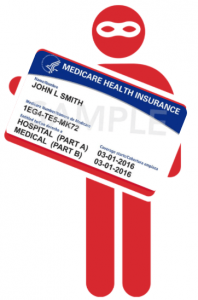Medicare is a lifesaving resource for the nearly 63 million Americans who are enrolled. Unfortunately, providers can make mistakes by misbilling or overbilling patients for services. Even worse, sometimes it isn’t a mistake. It’s a sad reality that sometimes Medicare fraud happens on purpose.
Medicare fraud can happen in two main ways:
- A third party falsely bills Medicare using your information, essentially committing medical identity theft.
- An individual provider or practice that you have used bills Medicare for a service, medication, or procedure that does not match the care you received.

Follow these 7 essential tips to avoid Medicare fraud:
How to Protect Against Medicare Fraud:
Through Medical Identity Theft:
Protect Your Information
 You should not give out personal health information such as your medical records to anyone who is not your physician or caregiver. If you receive requests for detailed medical information via phone or email, it is vital to be cautious. Talk to your actual healthcare providers and caretakers about their communication practices and policies regarding medical records. They will be able to help you identify legitimate requests.
You should not give out personal health information such as your medical records to anyone who is not your physician or caregiver. If you receive requests for detailed medical information via phone or email, it is vital to be cautious. Talk to your actual healthcare providers and caretakers about their communication practices and policies regarding medical records. They will be able to help you identify legitimate requests.
Along with never giving out health information to anyone you don’t trust, make it a habit to never give out sensitive personal information via email or over the phone, including bank account numbers, credit card details, online passwords, and your Social Security number, among other things.

Keep Your Cards Safe
Your Medicare card is as vital as one of your credit cards. You should only show or hand your Medicare card to a trusted provider or caregiver. Do not share your Medicare numbers or any other card information — especially pictures of your card — with anyone you would not trust with your healthcare.
Beware Salespeople
 Medicare is a health service to help older adults, not a product to be sold to anyone who will pick up the phone or answer the door. Be wary of anyone selling Medicare plans or Medicare-related products and services by calling you or knocking on your door.
Medicare is a health service to help older adults, not a product to be sold to anyone who will pick up the phone or answer the door. Be wary of anyone selling Medicare plans or Medicare-related products and services by calling you or knocking on your door.
The Department of Health and Human Services assures Medicare patients that the only two genuine types of Medicare-related phone calls are the following:
- “A Medicare health or drug plan can call you if you’re already a member of the plan. The agent who helped you join can also call you.”
- “A customer service representative from 1-800-MEDICARE can call you if you’ve called and left a message, or a representative said that someone would call you back.”
To Protect Against Medicare Fraud:
Through a Provider or Practice:
Check Your Statements
 Checking your Medicare documents is critical, and it is the most likely way you might see Medicare fraud in action. Reading through your statements and claims can not only help you catch a misbill or overbill by your provider, but can also help you catch potential medical identity theft. If you see that you were billed for a surgery you didn’t receive, see names and addresses of providers or practices you have not visited or do not know, or notice unusual changes in fees or costs you have been paying, call 1-800-MEDICARE (1-800-633-4227) right away.
Checking your Medicare documents is critical, and it is the most likely way you might see Medicare fraud in action. Reading through your statements and claims can not only help you catch a misbill or overbill by your provider, but can also help you catch potential medical identity theft. If you see that you were billed for a surgery you didn’t receive, see names and addresses of providers or practices you have not visited or do not know, or notice unusual changes in fees or costs you have been paying, call 1-800-MEDICARE (1-800-633-4227) right away.
Communicate With Your Provider
Healthcare providers are only human. Sometimes, you might have to correct a provider who has made an innocent mistake. However, other times, Medicare fraud happens when providers or practices purposefully bill for something unnecessary, incorrect, or nonexistent. Don’t hesitate to ask questions, take notes or voice recordings, and communicate with other medical staff on your care team. Your doctor should not put an incorrect diagnosis on your charts, recommend medication or a product only for the reason that “it’s free with Medicare,” or say that they plan to be purposefully deceptive in order to get something you need covered by Medicare.
Bring Someone Else
 Next time you have a virtual or in-person appointment, consider inviting a friend or loved one to join in and help record information or ask your provider questions. Someone else in the room can also make a provider think twice about pushing expensive lab tests you don’t need or selling you a mobility device that will not help you. A reputable practice will always allow you to bring someone to your medical appointments to help you advocate for yourself.
Next time you have a virtual or in-person appointment, consider inviting a friend or loved one to join in and help record information or ask your provider questions. Someone else in the room can also make a provider think twice about pushing expensive lab tests you don’t need or selling you a mobility device that will not help you. A reputable practice will always allow you to bring someone to your medical appointments to help you advocate for yourself.
Trust Your Gut
Sometimes, you can just feel when things are suspicious. If a provider is offering discounts if you take certain tests, starts offering gifts or other incentives, or gets overly persuasive or pushy, you might feel a pit in your stomach. Maybe someone left a suspicious message on your voicemail about Medicare benefits or medical debt relief or sent you a typo-riddled email offering “free” Medicare. Don’t dismiss that gut feeling. Consult with your real-life care team or call 1-800-MEDICARE to report the incident(s).
Turn to Medicare On Video
Still seeking more information on Medicare or deciding if it’s right for you? Medicare On Video wants to help you find the Medicare health plan that best fits your needs. Read up on the differences in Medicare plans in our article about Medigap G vs. N or learn about some of the 5 dumbest Medicare rules.
When choosing your Medicare service, consider Medicare On Video. We offer a complete resource center to make learning about and utilizing Medicare as simple as a few clicks! We offer many different services such as AARP Medicare made easy, readily available guides and forms, and a special website tool to compare your Medicare options. See how easy it can be to get all the facts on Medicare!
















